Xueren (English: The Scholar [1] ) was an influential Chinese independent intellectual journal that ran from 1991 to 2000. [2] It was founded and edited by Chen Pingyuan, Wang Hui, and Wang Shouchang under the sponsorship of a Japanese foundation. [2] In order to work around censorship conditions in the Chinese publishing industry that make it more difficult for periodicals to get approval than books, Xueren was published as a "series" in the latter format. [2] Other journals that have taken the same approach include Res Publica and Horizons . [2]
Scholar Chaohua Wang locates Xueren's origins in "the self-examination of intellectuals intimately involved in the ferment of the eighties":
The project of its editors [. . .] was to retrieve the history of modern Chinese scholarship (xueshu shi), a tradition they felt was in danger of being obscured or forgotten under the pressure of imported theories. In doing so, they wanted to clarify their own intellectual identity and responsibilities. What was their position in a historical chain of scholarly development? When and how should a scholar speak out on public issues? [2]
Co-founder Wang Hui characterizes his and his colleagues' motivations similarly, but without a critical approach toward "imported theories" in academe as a primary component of their intellectual project, and with more of an eye toward directly socially relevant goals. According to him, Xueren was created to facilitate an effort by young intellectuals to "reconsider" modern Chinese history in the wake of the failure of the 1989 democracy movement, a "process of reflection" that
included serious reconsideration of modern history, conscientious rethinking of attempts to carry out radical reform on the basis of Western models, close investigation of the Chinese historical legacy and its contemporary significance, and necessary critiques of certain of the consequences of radical political action.
However, Wang Hui states that Xueren "did not pursue any particular academic agenda." [3]
World history or global history is a field of historical study that emerged centuries ago, with leaders such as Voltaire, Hegel, Karl Marx and Arnold J. Toynbee. The field became much more active in terms of university teaching, text books, scholarly journals, and academic associations in the late 20th century. It examines history from a global perspective. It is not to be confused with comparative history, which, like world history, deals with the history of multiple cultures and nations, but does not do so on a global scale. World history looks for common patterns that emerge across all cultures. World historians use a thematic approach, with two major focal points: integration and difference.
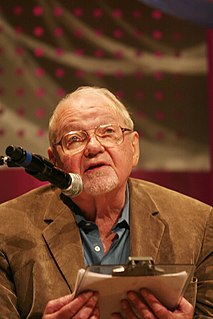
Fredric Jameson is an American literary critic, philosopher and Marxist political theorist. He is best known for his analysis of contemporary cultural trends, particularly his analysis of postmodernity and capitalism. Jameson's best-known books include Postmodernism, or, The Cultural Logic of Late Capitalism (1991) and The Political Unconscious (1981).

The historiography of the French Revolution stretches back over two hundred years, as commentators and historians have sought to answer questions regarding the origins of the Revolution, and its meaning and effects. By the year 2000, many historians were saying that the field of the French Revolution was in intellectual disarray. The old model or paradigm focusing on class conflict has been challenged but no new explanatory model had gained widespread support. Nevertheless, there persists a very widespread agreement to the effect that the French Revolution was the watershed between the premodern and modern eras of Western history.

The New Culture Movement of the mid-1910s to 1920s sprang from the disillusionment with traditional Chinese culture following the failure of the Chinese Republic – founded in 1912 – to address China's problems. Scholars such as Chen Duxiu, Cai Yuanpei, Chen Hengzhe, Li Dazhao, Lu Xun, Zhou Zuoren, He Dong, Qian Xuantong, Liu Bannong, Bing Xin, and Hu Shih, had classical educations but began to lead a revolt against Confucianism. They called for the creation of a new Chinese culture based on global and western standards, especially democracy and science. Younger followers took up their call for:

Anthony James Gregor was a Professor of Political Science Emeritus at the University of California, Berkeley, well known for his research on fascism, Marxism, and national security.
The Chinese New Left is a school of political thought in China that criticizes capitalism and some aspects of Chinese economic reform. It favors certain elements of Maoism, including the significant role of state planning, the preservation of state-owned enterprises, and a renewed collectivism. The ambiguity of the term New Left in China arises from its breadth. Generally speaking, New Left can be applied to a person who embraces leftist theories, ideals and traditions ranging from Marxism to socialism, postmodernism and other schools criticizing neoliberalism.
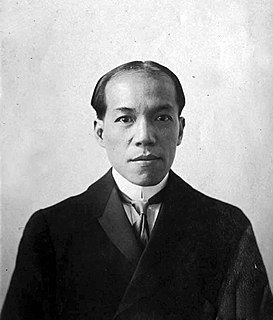
Liang Qichao was a Chinese historian, journalist, philosopher, and politician who lived during the late Qing dynasty and the early Republic of China. He inspired Chinese scholars with his writings and reform movements.
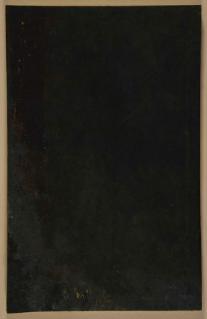
Huangdi Neijing, literally the Inner Canon of the Yellow Emperor or Esoteric Scripture of the Yellow Emperor, is an ancient Chinese medical text that has been treated as the fundamental doctrinal source for Chinese medicine for more than two millennia. The work is composed of two texts—each of eighty-one chapters or treatises in a question-and-answer format between the mythical Yellow Emperor and six of his equally legendary ministers.
John Greville Agard Pocock is a historian of political thought from New Zealand. He is especially known for his studies of republicanism in the early modern period, his work on the history of English common law, his treatment of Edward Gibbon and other Enlightenment historians, and, in historical method, for his contributions to the history of political discourse.

Giovanni Arrighi was an Italian economist, sociologist and world-systems analyst, from 1998 a Professor of Sociology at Johns Hopkins University. His work has been translated into over fifteen languages.
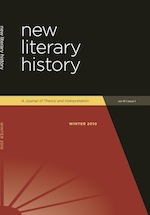
New Literary History: A Journal of Theory & Interpretation is a quarterly academic journal published by Johns Hopkins University Press. It focuses on the history and theory of literature, and key questions of interpretation. The journal has received six awards from the Council of Editors of Learned Journals.
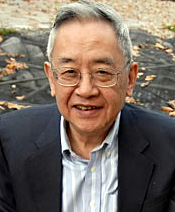
Yu Ying-shih is a Chinese-born American historian and sinologist known for his mastery of sources for Chinese history and philosophy, his ability to synthesize them on a wide range of topics, and for his advocacy for a new Confucianism. He was a tenured professor at Harvard University, Yale University, and Princeton University, and is an Emeritus Professor of East Asian Studies and History, Princeton University.

Qin Hui is a Chinese historian and public intellectual. He previously held the position of Professor of History, Institute of Humanities and Social Sciences, Tsinghua University, Beijing. He is now an Adjunct Professor in the Department of Government and Public Administration, the Chinese University of Hong Kong.
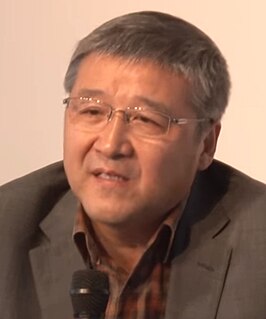
Wang Hui is a professor in the Department of Chinese Language and Literature, Tsinghua University, Beijing. His researches focus on contemporary Chinese literature and intellectual history. He was the executive editor of the influential magazine Dushu from May 1996 to July 2007. The US magazine Foreign Policy named him as one of the top 100 public intellectuals in the world in May 2008. Wang Hui has been Visiting Professor at Harvard, Edinburgh, Bologna (Italy), Stanford, UCLA, Berkeley, and the University of Washington, among others. In March 2010, he appeared as the keynote speaker at the annual meeting for the Association of Asian Scholars.

Arif Dirlik was a US historian of Turkish origin who published extensively on historiography and political ideology in modern China, as well as issues in modernity, globalization, and post-colonial criticism. Born in Mersin, Turkey, Dirlik received a BSc in Electrical Engineering at Robert College, Istanbul in 1964 and a PhD in History at the University of Rochester in 1973.
Zhang Chengzhi is a contemporary Hui Chinese author. Often named as the most influential Muslim writer in China, his historical narrative History of the Soul, about the rise of the Jahriyya (哲合忍耶) Sufi order, was the second-most popular book in China in 1994.
Robert Warburton Cox was a Canadian scholar of political science and a former United Nations officer. He was cited as one of the intellectual leaders, along with Susan Strange, of the British School of International Political Economy and was still active as a scholar after his formal retirement, writing and giving occasional lectures. He was professor emeritus of political science and social and political thought at York University.
Ethan Kleinberg is Class of 1958 Distinguished Professor of History and Letters at Wesleyan University, Editor-in-Chief of History and Theory and was Director of Wesleyan University's Center for the Humanities. Kleinberg's wide-ranging scholarly work spans across the fields of history, philosophy, comparative literature and religion. Together with Joan Wallach Scott and Gary Wilder he is a member of the Wild On Collective who co-authored the "Theses on Theory and History" and started the #TheoryRevolt movement. He is the author of Haunting History: for a deconstructive approach to the past and Generation Existential: Martin Heidegger’s Philosophy in France, 1927-61, which was awarded the 2006 Morris D. Forkosch prize for the best book in intellectual history, by the Journal of the History of Ideas and co-editor of the volume Presence: Philosophy, History, and Cultural Theory for the Twenty-First Century. He is completing a book length project titled The Myth of Emmanuel Levinas, on the Talmudic Lectures the French-Jewish philosopher Emmanuel Levinas presented in Paris between 1960 and 1990.
"Contemporary Chinese Thought and the Question of Modernity" is an influential article of around 35,000 characters in length by Chinese intellectual historian and literary scholar Wang Hui, written in 1994 and published in left-wing literature journal Tianya (天涯) in 1997. An English translation by Rebecca E. Karl appeared in a volume of Social Text titled "Intellectual Politics in Post-Tiananmen China" (1998).

Comparisons between the Roman and Han empires involve the comparative study of the roughly contemporaneous Roman Empire and the Han dynasty of early imperial China. At their peaks, both states controlled a large portion of the world population and produced political and cultural legacies that endure to the modern era; comparative studies largely focus on their similar scale at their pinnacles and on parallels in their rise and decline. The vast majority of studies focus on one or the other; however, the comparison of the two has attracted somewhat increased interest in the 21st century, with several studies examining the concepts of ethnicity, identity, and the views of foreigners.












